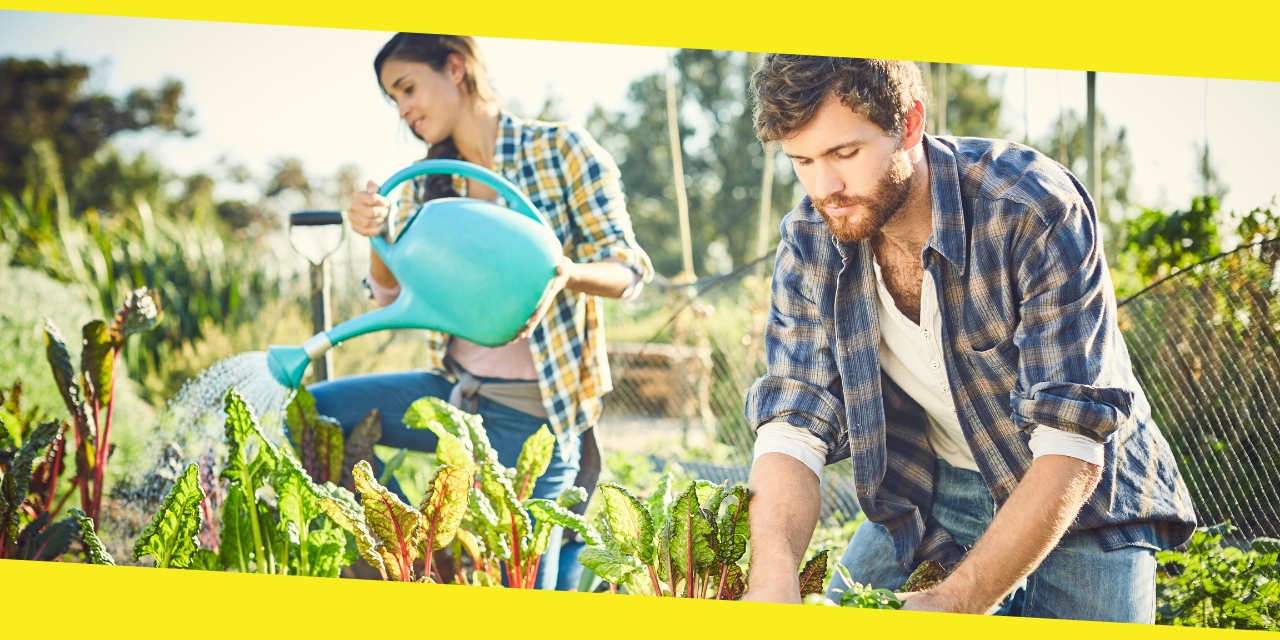Organic Farming vs Conventional Farming
This post was last updated on April 10th, 2024

The survival of humans is mainly dependent on agriculture. For centuries, man has been making different innovations to alter farming to suit their needs. For example, tractors were devised to reduce the workload of At present, two fundamental types of agriculture are practised worldwide: organic and conventional farming. Ongoing debates have constantly been happening over which of the two is better. We are here to clear doubts if you are unaware of these farming methods. Conventional farming has been the norm forever and is observed to be the most practised method. However, organic farming has gained massive popularity in the last two decades as people have started preferring organic foods. Let us dive right into what each of the farming methods offers.
The Definition
Conventional farming involves the application of chemicals like pesticides to achieve the highest crop yield. Crop quality is put at stake to focus more on profits. Chemicals are applied using tractors to ward off pests and weeds. Not only this, but farmers use artificial nutrients for plants. Conventional farming is not sustainable as it takes a massive toll on the environment and soil. These chemicals are the primary cause of GHG emissions, soil erosion and water pollution. It also has an adverse impact on human health. Farmers must understand that only aiming at yield will harm the environment, ecology and health. Conventional farming is just about short-term benefits and involves heavy natural resources and synthetic chemicals exploitation.
In contrast, organic farming relies on sustainable methods to grow crops. The goal is to enhance the natural fertility of the land. Examples of involved techniques include natural fertilisers, companion planting and crop rotation. Organic farming improves the safety and health of the soil to provide high-nutrition crops. Biological fertilisers are known for building organic soil matter. With an increase in the organic soil matter, organic farmers improve the ability of soil to absorb water. It also reduces the effects of flooding and drought. Organic farming puts a heavy emphasis on sustainability. The goal of food production is not to compromise on resources, health and nature. Thus, the focus is more on long-term gains than short-term benefits. Organic farming respects nature for generations to come.
The Difference
One of the main differences between conventional and organic farming is that the former depends on chemical intervention to offer crop nutrition and fight weeds or pests. It includes fertilisers, herbicides and pesticides. At the same time, organic farming uses natural practices like composting and biodiversity to yield healthy food. It applies methods that were used centuries ago in today’s world. Using green manure crops and composted animal manure along with crop rotation is also highly economically sustainable. Organic farmers employ different strategies for the replenishment of soil fertility and maintenance of biological diversity.
Also, you will notice that organic and conventional farming have dissimilar consequences on the people and environment. Conventional farming is a threat to human health as it results in water pollution, soil erosion and greenhouse gas emissions. In comparison, organic agriculture leaves a reduced carbon footprint. It develops and maintains soil health while replenishing the natural ecosystem. As a result, air and water turn cleaner with no toxic residues.
| Conventional Farming | Organic Farming | |
| Fertilisers | Artificial fertilisers | Natural fertilisers, including compost and manure |
| Land degradation | Uses artificial pesticides to degrade soil and land quality | Uses crop rotation and natural fertilisers to enhance soil quality |
| Soil | Exploitation results in infertile soil | Fertility remains intact |
| Nutrient | Results in nutrient loss | Produces highly nutrient food |
| Environment | Toxic for the natural ecosystem | Sustainable |
| Genetically modified organisms | Uses GMOs to improve crop yield | Discourages the use of GMOs |
| Animals | Livestock are often given antibiotics | Lack of animal cruelty |
| Farming | Farming focuses just on increasing the output and the economy | Maintain soil quality via companion planting, crop rotation and mixed crops |
| Health & Safety | Crops threat to human health | No danger to animal or human health |
Why Organic Farming?
The pros of organic farming are more excellent than those of conventional one. Organic producers are paving the way for sustainable agriculture. They always keep the health of people and the environment under consideration. In India, there is still a lot to do regarding organic farming. When the country faces issues like food security, rural poverty and agricultural productivity, organic farming is the way forward.
While conventional practices like stubble burning cause soil erosion and infertility, organic agriculture can raise agricultural productivity. Crop rotation maintains productivity while ensuring food security in the long run. High productivity translates to low rural poverty. Unaware producers exploit the farm until it turns infertile after some years. An unproductive farm means there is no livelihood anymore. A farmer can get buried in debt and forced to take his own life.
The Future
The future of traditional or conventional farming does not appear so good. It has to evolve and take up elements of organic agriculture to survive. Even though the farmers use chemical products, they are pressured by the market to implement sustainable farming techniques. Regenerative agriculture or no-till are some production practices that use similar principles to organic farming, like ecosystem management, biodiversity and soil health. In addition, conventional farming will adopt more science and technology. The focus will be kept on resource efficiency to enhance the economic sustainability of the farmers. Precision farming methods will play an essential role in improving the environment.
Organic farming will be in high demand in the coming decades as the market for organic food items is rising, and wealth expansion is predicted in developing countries. Nevertheless, issues such as greater production costs plague the organic movement. New technology and organic-approved products will help enhance production efficiencies for organic producers. It will be suitable for them to remain competitive in the market. When customers adopt organic food products more, organic farming will see sharp growth. The modern population is not only concerned about the variety of food but also about their origin. There is a vast potential for growth in the organic sector.
Recommended: Boosting Agricultural Productivity | Lessons from Meg Miller’s Experience
Recommended For You
6 Tips for Sourcing the Best Coffee Beans for Your New Café
Most Inside
Most Inside offers high-quality recommendations and valuable updates to enhance all aspects of your life, providing premium guidance and enriching experiences.




